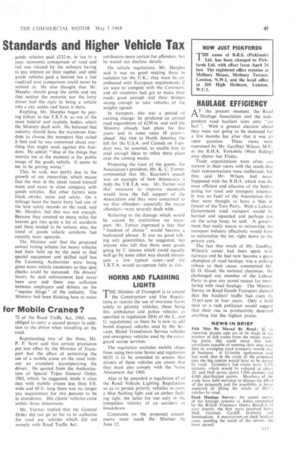HAULAGE EFFICIENCY
Page 49

If you've noticed an error in this article please click here to report it so we can fix it.
AT the present moment the Road Haulage Association and the independent road hauliers were only "on bail ". With a general : electionahead they were not •going to be Molested for a few months but after that it was an open question. These views were expressed by Mr. Geoffrey Wilson. M.P., at the R.H.A. Yorkshire (West Riding)
area dinner last Friday.
Trade organizations were often too narrow in their views with the result that their representations were ineffectual, but this, said Mr. Wilson, had never happened with the R.R.A. which was the most efficient and effective of the bodies acting for road and transport interests. It was no fault of the Association that they were thought to have a bias in favour of the Tory Party. With a Labour Government road transport would be harried and squeezed and perhaps put on the scrap heap, he said. A government that really meant to rationalize the transport industry effectively would have to nationalize the lot, right down to the private cars.
The fact that much of Mr. Geoffrey Wilson's career had been spent with railways and he had now become a great champion of road haulage, was a striking tribute to their cause, commented Mr. D. 0. Good, the national chairman. He challenged any member of the Labour Party to give any sound reason for interfering with road haulage, The Ministry Survey on Road Goods Transport showed that the hauliers' traffic had risen by 33 per cent in four years. Only a bold man or a rash politician would suggest that their rise in productivity deserved anything but the highest praise, NEWS IN BRIEF
Fish may Be Moved By Road: If, as reported, drastic cuts are to be made in he number of fish trains from the major trawling ports, this could mean that only merchants capable of running their own road fleet or arranging road transport would stay in business. A. Grimsby spokesman said last week that in the event of the proposed cuts the big centres would have to be served by road. Grimsby's fish trains serve 1.25n stations, which would be reduced to about 25, and Hull serves about 1,000 stations and 4.000 distribution Points. Members of the trade have held meetings to discuss the effect of the proposals and the possibility is being explored of lifting the whole of Hull', catches by road.
Dock Haulage Survey: An expert surto' of the haulage systems at docks controlled by the British Transport Docks Board is to start .shortlY, the first Doris involved beinLi Hull, .Garston, Cardiff, Grimsby and Immingham. A moratorium on dock haulage rates, pending the result of the survey, has been agreed,




















































































































































































































































